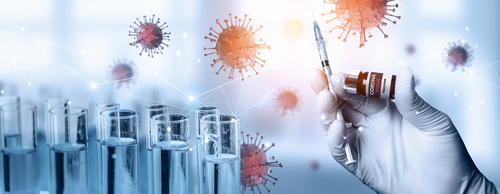
The University of Chicago Medicine is conducting a clinical trial to study the potential of an antibody treatment for COVID-19.
For the trial, called BLAZE-1, the University of Chicago is recruiting 22 participants to be treated with the LY-CoV555 antibody developed by Eli Lilly and Company in collaboration with AbCellera. The antibody was identified by scientists at the National Institute of Allergy and Infectious Diseases and AbCellera in a blood sample from a U.S. patient who had recovered from COVID-19. The antibody targets and binds to the spike protein on the surface of the SARS-CoV-2 virus, preventing it from attaching and entering into human cells. Without access to cells, the virus can’t replicate.
“There is data showing that the LY-CoV555 antibody can block the virus from replicating in cells in the lab,” said David Pitrak, chief of the section of infectious diseases and global health at UChicago Medicine. “Now we’re going ahead with the human studies to see if treating patients with this antibody reduces their viral load, which is associated with better clinical outcomes, and would also likely make patients less contagious for the virus.”
The antibodyʻs safety was initially evaluated in a Phase 1 clinical trial that started in June 2020. This Phase 2 trial will expand the safety testing and examine the effects of the antibody on reducing viral load, clinical symptoms, and signs of infection in patients with mild to moderate cases of COVID-19.
“Right now, we’re testing the effects of a single dose of the antibody,” Pitrak said. “When a patient comes into the ER with compatible symptoms and is diagnosed with COVID-19, but isn’t sick enough to require hospital admission, we can ask if they’d like to enroll in this study. They will be given an infusion of the antibody or a placebo right there in the ER before they get sent home.”
Study participants must have tested positive for SARS-CoV-2 infection within three days prior to the study and have one or more mild or moderate COVID-19 symptoms, including fever, cough, sore throat, headache, muscle pain, nausea, abdominal pain, diarrhea, or shortness of breath when active.
Patients will be tracked for up to 90 days, with researchers testing three different doses of the antibody and monitoring any side effects. They will also measure the viral load in the respiratory tract and the levels of the antibody in a person’s bloodstream. These measures will help determine how effective the antibody is at treating the virus.
This study represents an alternative approach to passive immunity by giving convalescent plasma to treat COVID-19. This approach circumvents challenges such as plasma availability and biocompatibility issues and provides a treatment that more thoroughly neutralizes the virus.
“While this specific neutralizing antibody is new, it’s not without precedent,” Pitrak said. “Disease-specific monoclonal antibody therapies are already used in the clinic for treating HIV, as well as in children with respiratory syncytial virus and patients with recurrent C. difficile infections.”
If effective, the antibody will provide new opportunities for treating patients with COVID-19, particularly those with compromised immune systems who may not be good candidates for a future vaccine.




